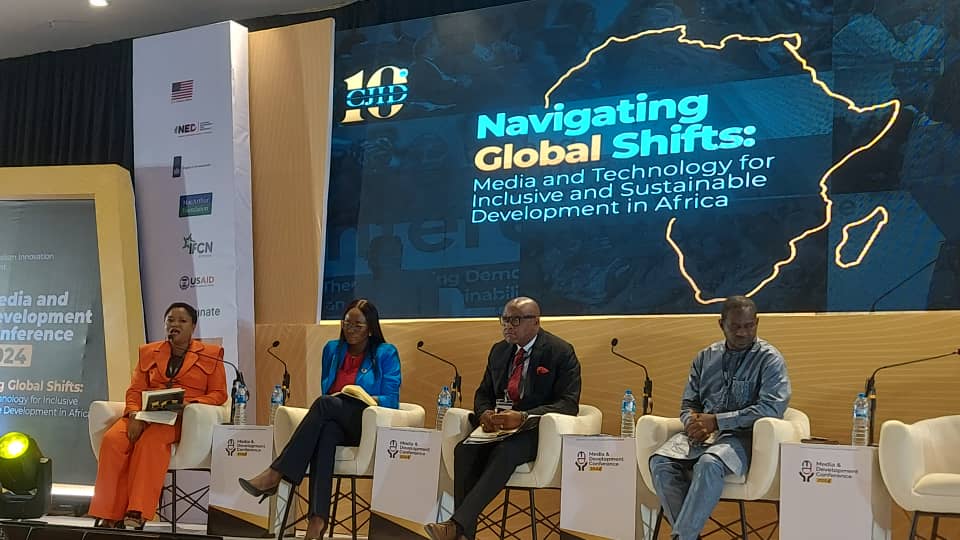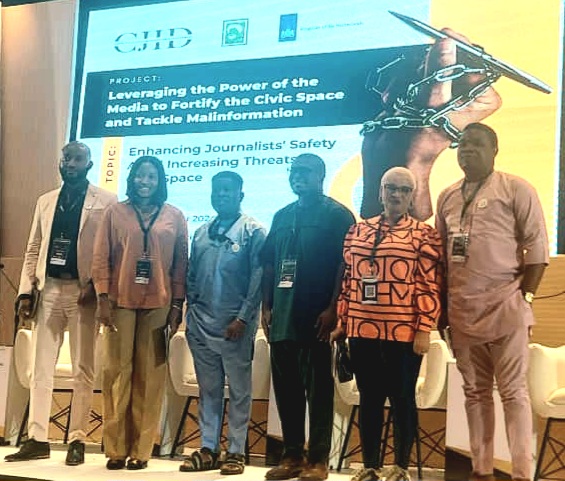Shrinking Civic Spaces and Attacks on Female Journalists: A Growing Concern in Nigeria
The Centre for Journalism and Innovation Development (CJID) today hosted a panel discussion on the shrinking civic spaces and attacks…
The Centre for Journalism and Innovation Development (CJID) today hosted a panel discussion on the shrinking civic spaces and attacks on female journalists in Nigeria.
Prof Audrey Gadzekpo, a board member of CJID in her welcome address emphasized the importance of media in promoting development and democracy in the West African region. She highlighted the challenges faced by the media, including the rise of disinformation and propaganda, and the need for ethical standards to promote community cohesion and foster shared identity.
“We must reimagine the technical advance role of the media as it serves as the platform to producing and processing information to the public,” Prof Gadzekpo said. “It is even more indispensable for public engagement, empowering citizens, and spotlighting public issues across the 50 ECOWAS stations.”
A Documentary and Paper Presentation on the Hidden Battles: Patterns and Nuances of Violence against Female Journalists in Nigeria by Charles Asiegbu captured datasets on the increasing number of attacks on female journalists in the line of duty, calling on the need for both media organisations and the security agencies to be more proactive in protecting women in media while on the job.
A plenary session moderated by Busola Ajibola, Deputy Director, Journalism Programme (CJID) led the discussion on Addressing the State of Attack on Media and Civic Space in Nigeria. One of the panelists, Anthony Okechukwu Ojokwu, Execitive Secretary, National Human Rights Commission (NHRC), spoke on what he describes as the robust framework of the commission that protects anyone being threatened and ensures rights are addressed. “We have a special investigation commission that has a desk to address these issues,” said a representative of the commission. “We work with every civic society, and we have sensitization activities to inform Nigerians about their rights.”

Musikiliu Mojeed, Nigerian President of the International Press Institute and Editor-in-Chief Premium Times emphased the role of media bodies and organisations to ensure media’s voice is not stifled in any form through additional bills on the floor of the national bills. He commended the impact of the Ombudsman role in the recent Daily Trust report on the Samoa agreement as a better approach to dealing with disputes within the media landscape.
The technical session: Enhancing Journalits’ Safety Amid Increasing Threats to Civic Space was a key theme, with panelists sharing their experiences and insights on the issue.
Juliana Ebere Francis, Deputy Editor, The Eagle Online recounted her personal experiences dealing with repeated sexual harrasment from male colleagues within the media newsroom, emphasing that women who reject sexual advances from male colleagues have their reputations quickly smeared in a patriarchal society that thrives on misogyny. Uju Nwankwo, the Compere of the day’s session called for the need to have gender policy for the newsroom and broadcast media that protects female journalists with a competent HR department that ensures the implementation of anti-sexual harrasment and similar behaviour in the workplace.
On the shriking of civic spaces within Nigeria’s ecosystems, Chioma Okoli’s case on consumerism was cited as an example of abuse of power within the civic space. The need to identify the manifestations of the striking spaces in Nigeria by documenting examples, incidents, and policies in Nigeria was emphasised in addressing the state of attack on media and civic space in Nigeria.

The discussion also highlighted the need for collective responsibility to promote useful societies and explore resolutions to make spaces for journalists for their safety and be progressive.
Nelson Olanikpekun, Executive Director, Citizens Gavel cited the famous line “Anyone with a cellphone and a grudge can create information.” That famous line was said by Angie Holan, Director of the International Fact-checking Network (IFCN). She emphasised that “We must approach digital innovation with responsibility, integrity, and a commitment to fact-based journalism.”
Key Challenges Facing Journalists in Nigeria
- Constitutional provisions: Section 2 and 39 of the Nigerian Constitution limit the work of journalists, while Section 13 states that all persons working in government must fulfill the provisions of the constitution.
- Lack of exposure of corruption: Corruption is a significant challenge in Nigeria, and the lack of exposure of corruption does not lead to economic advancement and structural development.
- Attacks on journalists: Over 1,200 attacks on journalists have been documented in Nigeria by CJID, with 142 attacks recorded under the current administration.
- Climate debt swap: The concept of climate debt swap was criticized for perpetuating the debt trap, undermining sovereignty, and ignoring the root causes of climate change.
The Way Forward
The CJID panel discussion emphasized the need for a collective effort to address the challenges facing journalists in Nigeria. This includes promoting ethical standards, combating disinformation, and advocating for policies that protect the rights of journalists.
“We need to hold actors accountable for the protection of their staff,” said Busola Ajibola, a representative of CJID. “We must work together to create a safe and enabling environment for journalists to do their work.”
The discussion concluded with a call to action for all stakeholders to work together to promote a free and independent press in Nigeria.





Comments